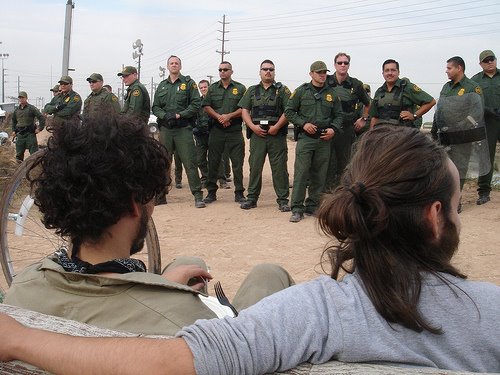Wednesday, December 17, 2008
Immigration Enforcement Benefits Prison Firms
By MEREDITH KOLODNER
Published: July 19, 2006
As the Bush administration gets tougher on illegal immigration and increases its spending on enforcement, some of the biggest beneficiaries may be the companies that have been building and running private prisons around the country.
http://www.nytimes.com/2006/07/19/business/19detain.html
Tuesday, December 2, 2008
Immigrants Drive Prison Profits
Americas Policy Program, Center for International Policy (CIP)
americas.irc-online.org
Immigrants are behind one of America's fastest growing, most profitable industries. That shouldn't come as a surprise. Immigrants have always been a core factor in U.S. economic development.
Mining, railroads, agribusiness, and, recently, construction have been among the many U.S. industries that historically been driven by an abundant supply of immigrants. But now, when the economy is imploding, most industries are shedding immigrants. The private prison industry, however, is booming, largely because of the ever-increasing supply of immigrants supplied by the federal government.
Read the full article here
Outside of Europe
'Outside of EUrope' is a critical, short documentary examining the exclusionary nature of EU immigration and border policies and the responsibilities that are placed on periphery countries to handle the flow of migrants and refugees. Ukraine is used as the case study. Far from the eyes of the public, and never seen before on film, the documentary takes the viewer inside the Mukachevo Detention Centre for Women and Children Refugees, as well as the Pavshino Detention Centre for Illegal Migrants and Refugees in Ukraine. Through diverse interviews that include refugees who failed in their attempt to cross into the EU, as well as officials such as the Immigration Minister for the Transcarpathia region, 'Outside of EUrope' throws light on various human right issues that incur from the expansion of the European Union.
If you want to purchase a DVD copy of 'Outside of EUrope'
please contact us.
VIDEOGRAPHY
'Outside of EUrope' (2007)
27:40 min MiniDV, NTSC 4:3
Filmed in Ukraine, August 2007.
Post-produced in Belgrade,
Serbia, November 2008.
There are 15 and 28 minute cuts of this film available from www.wideopenexposure.com. Or email wideopenexposure@gmail.com.
Thursday, October 23, 2008
CFPs: Beyond Cages and Walls
Call for Submissions – Please circulate widely
Deadline February 15, 2009
Description and Purpose:
In the US, some 2.4 million people are imprisoned while 1.6 million migrants have been deported since 1996. On a world scale, while most people’s movement is constrained by a system of global apartheid, policing strategies are shared across national borders that are commonly used to crack down on political organizing and dissent. What are the connections between the prison industrial complex and migration policies that are symbolized by deadly cages and walls? How do these different state policies both divide and connect different groups of people across nationality, citizenship, race, class, gender, and sexuality? What work do these sturdy tools of division, isolation, and control do at this moment of economic crisis? What are the ideologies that make walls and cages seem so durable, and what cracks in these edifices can movements for social justice and liberation open up?
Making links between prison policies and migration policies is important for being able to understand and challenge white supremacy, US imperialism, capitalism, and militarization. We want to understand the ways in which the prison abolition and immigrant justice movements are opposing state violence and the creative ways in which they are working to build a world without walls and cages. How might organizing around the “right to stay” be a way of bridging communities who face economic dislocation – whether through free trade policies or gentrification – and repressive state policies alike?
This collection will bring materials from people who are directly affected by these systems together with work from organizers, activists, advocates, artists, poets, and researchers. We invite a range of submissions, including poems, testimonies, visual arts, analyses, criticism, strategies and campaigns for change. We will be publishing this book with a popular independent press.
About the editors:
Jenna Loyd is a scholar-activist who is a member of the Syracuse-based Detainment Task Force, which organizes against migrant detention and raids. Matt Mitchelson is a geographer researching imprisonment and working with former prisoners. Andrew Burridge is a geography graduate student and activist working towards freedom of movement within the U.S.-Mexico borderlands and beyond.
If you are interested in learning more about or contributing to this project, please see http://beyondcagesandwalls.blogspot.com, or contact Jenna Loyd at jloyd@gc.cuny.edu, 310-490-9166, Center for Place Culture and Politics, CUNY Graduate Center, 365 Fifth St, New York, NY 10016.
